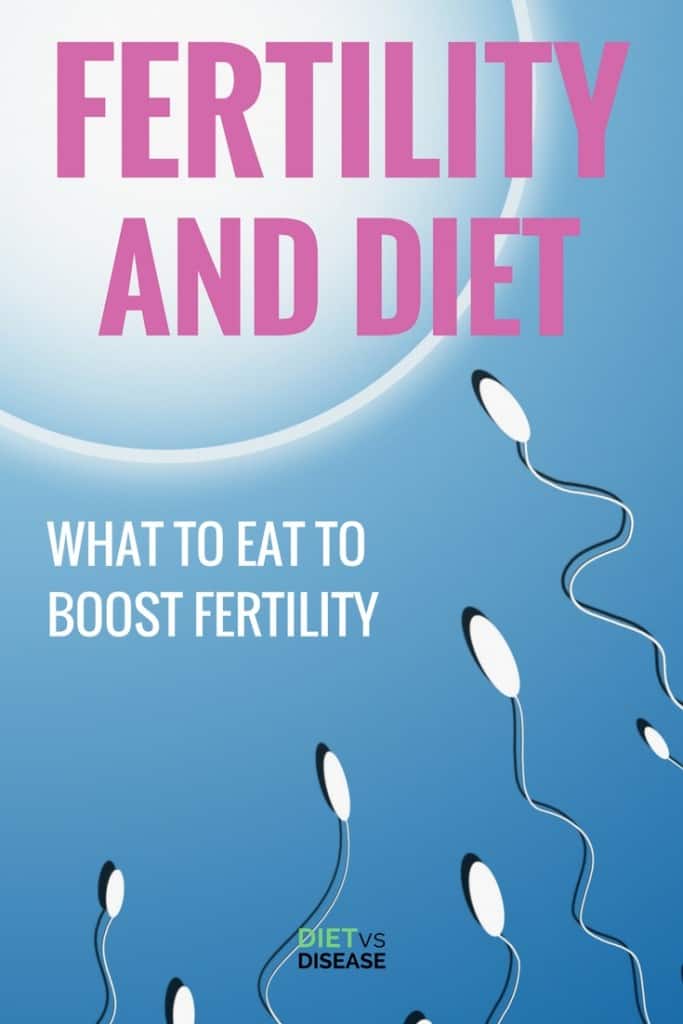Struggling to fall pregnant?
You’re not alone. In fact, 10-15% of couples face fertility issues (1).
In addition to taking a pre-conception multivitamin, there are certain diet and lifestyle changes that can improve fertility by up to 69% (2).
This article summarizes 6 key diet changes that research indicates can boost natural fertility.
1. Eat More Green Leafy Vegetables and Fortified Grain and Cereal Foods For Folate
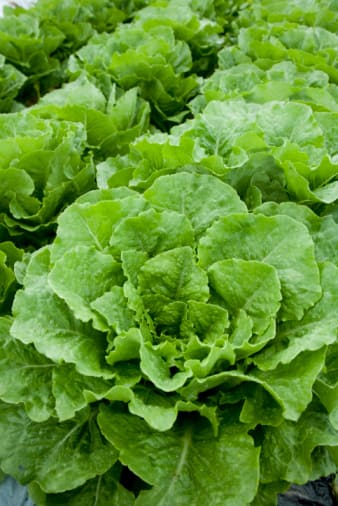
Green leafy vegetables such as spinach, asparagus and broccoli, as well as fortified grain and cereal foods are rich sources of folate (3).
A high intake of folate is consistently linked to better fertility, less pregnancy losses, and more successful fertility treatment outcomes (4).
One study that followed more than 200 women over two years found that folate intakes over 500ug was associated with positive changes to a woman’s menstrual cycle (5).
It found that women were more likely to ovulate (release an egg) and have higher progesterone levels after ovulation. This is important to ‘ripen’ the endometrium (uterine lining) to allow a fertilised egg to implant.
Another study involving over 200 women also found positive effects of folate on fertility levels in women undergoing IVF treatment (6).
Researchers found that folate intakes above 800ug improved the chance of IVF success and live births by 20%.
Summary: Eating more folate-rich foods such as green leafy vegetables and fortified grain and cereal foods can help improve ovulation rates, progesterone levels after ovulation, IVF success rates and live births.
2. Swap Refined Grains to Wholegrains, and Cut Down on Carbs
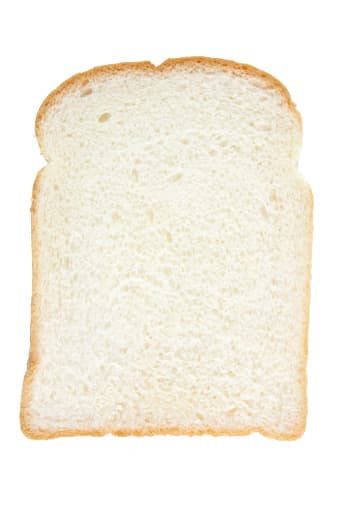
Refined grains are found in foods like white bread, pasta, rice and high fat, high sugar foods like cakes, biscuits and pastries.
They are absorbed into the bloodstream very quickly, causing a spike in blood sugar and insulin levels.
This can have negative effects on ovulation rates (7).
On the other hand, wholegrains are different.
They have the bran, germ and endosperm still intact, along with fibre and other important nutrients for health and fertility.
Some examples of wholegrains include wholegrain bread and pasta, brown rice, oats, quinoa and buckwheat.
A simple swap to include at least 2 serves of wholegrains, such as 2 slices of wholegrain bread, can improve implantation and live birth rates in IVF patients and is thought to help improve ovulation rates (7, 8).
Additionally, the amount of carbs eaten also has an impact on female fertility.
A high carb diet can increase the risk of anovulation by 78% (7).
However, for women with Polycystic Ovarian Syndrome (PCOS), reducing carbs can reduce insulin, improve hormone imbalances and restart ovulation (9).
Summary: Swap out processed carbs to wholegrains, and lower overall carb intake to improve ovulation and IVF success rates.
3. Choose Lean Meat, Poultry and Eggs Over Fatty Meats

Lean animal protein foods are high in zinc and vitamin B12.
Both of these nutrients are important in fertility.
This includes steak, lamb and pork with visible fat trimmed, chicken with the skin removed, and eggs.
A recent review found that zinc levels in men with fertility issues were lower than those without fertility issues. Higher zinc levels were also linked with better sperm and sperm quality (10).
There is no dose recommendation for zinc and fertility, however the Dietary Reference Intakes for adult men is 11mg per day (11).
For example, 150 grams of lean steak contains 5mg of zinc and 2 eggs has 1mg of zinc.
Additionally, vitamin B12 appears to be another really important nutrient in improving sperm quality, and also has its benefits in female fertility (12, 13).
In particular, meeting vitamin B12 requirements has been associated with influencing egg health, ovulation, implantation and preventing recurrent miscarriages (14).
Summary: Lean animal protein sources are linked with improving both male and female fertility.
4. Eat At Least One Serve of Nuts, Seeds and Legumes Each Day
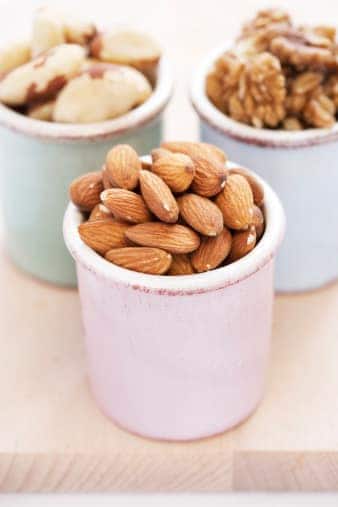
Nuts, seeds and legumes are good sources of plant-based protein, plant-based (non-heme) iron and vitamin E.
Researchers have found that including even just 5% of total energy as plant-based protein can reduce ovulation issues by 50% (15).
This is equal to a handful of nuts.
Eating more plant foods to get iron rather than animal sources is also an effective way to improve ovulation (16).
Additionally, another study found that 400IU of vitamin E supplements improved the endometrial (uterine) lining during ovarian stimulation and IUI cycles (both are different types of infertility treatment) (17).
And the benefits continue for men and their fertility.
Researchers found that when men who had sperm motility issues were supplemented with 200ug of selenium and 500IU of vitamin E, their sperm quality and motility improved (18).
Summary: Include more plant-based protein to improve ovulation rates, unexplained infertility and sperm quality.
5. Eat At Least 2-3 Serves of Fatty Fish Per Week
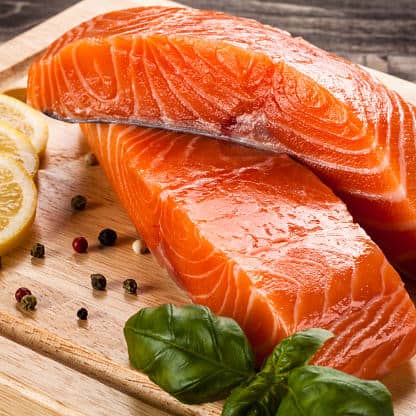
Fatty fish refers to fish species high in omega-3 fatty acids.
These include salmon, tuna and sardines.
Unfortunately, the average person does not meet the recommended daily intake of omega-3 fatty acids (19).
Interestingly, research suggests that infertile men may have lower levels of omega-3 in their bloodstream than fertile men (20).
Therefore, increasing omega-3 intake through diet and supplementation to 250-500mg/day can improve sperm quality and boost male fertility (21).
And women also benefit from a higher intake of omega-3s (22).
In a recent study of women who have PCOS and are above the healthy weight range (BMI over 25), 3 grams of omega-3s per day for eight weeks improved hormone levels and menstrual cycles became more regular (10).
Additionally, we know that as we age, the quality of female eggs deteriorates.
However, omega-3s may also help counteract this (11).
An animal study high in omega-3 prolonged reproductive function and improved egg quality.
Given the potential benefits of Omega-3s, taking a fish oil supplement in addition to eating more fatty fish can help optimize fertility.
Summary: Including more fatty fish can improve sperm quality, improve hormone levels and ovulation in women with PCOS, and prolong reproductive function and maintain egg quality in women.
6. Swap At Least One Serve of Low Fat Dairy to Full Fat Dairy
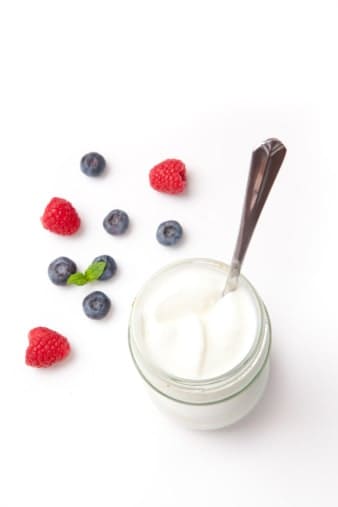
Dairy products include milk, cheese and yogurt.
Full fat dairy products have been linked with a reduced risk of anovulation (not ovulating) (24).
It’s proposed that there are substances in full fat dairy responsible for this effect.
It makes sense then that this large study of almost 20,000 women found that adding a daily serve of full fat milk into their diet significantly reduced the risk of ovulation issues by 27%.
Additionally, another study found that total dairy intake was associated with better IVF outcomes in women over the age of 35 years (25).
However, the researchers were unable to explain how this works and so they recommended that their findings should be taken with caution.
Summary: Full fat dairy products can help regulate a woman’s cycle and total dairy may improve IVF success rates in women over 35 years old.
3-Day Sample Fertility Meal Plan
To give you an idea of what an appropriate eating pattern might look like:
Day 1
Breakfast: 2 wheat biscuits with ½ cup of milk and ½ sliced banana
Morning Tea: Tub of yoghurt and a handful of blueberries
Lunch: Tuna sandwich made on whole-grain bread with a slice of cheese and 1 cup of mixed salad vegetables
Afternoon Tea: Handful of nuts
Dinner: Chicken stir fry with 2 cups of vegetables and ½ cup of cooked brown rice
Supper: ½ cup of custard with stewed strawberries
Day 2
Breakfast: ½ cup cooked oatmeal made with ½ cup of milk and stewed fruit
Morning Tea: 4 small whole-wheat crackers with cheese
Lunch: Falafel whole-grain wrap with 1 cup of salad vegetables
Afternoon Tea: Tub of yoghurt
Dinner: Roast beef with baked vegetables
Supper: Orange
Day 3
Breakfast: Smoked salmon, poached egg, grilled tomato and mushrooms on 1 slice of multigrain bread
Morning Tea: Piece of fruit
Lunch: Left over roast beef rice salad with balsamic dressing
Afternoon Tea: Hummus and vegetable sticks
Dinner: Spinach and ricotta cannelloni served with a green salad
Frequently Asked Questions
1. What are some other lifestyle changes that can help to boost fertility?
A recent study reviewed a number of lifestyle factors that can affect fertility. The main changes are (26):
- Aim for a healthy weight (BMI: 20-25) – being underweight or overweight negatively influences hormone levels, menstrual cycles and sperm amounts and its quality
- Exercise in moderation – the exact amount of exercise is unknown, however it appears that exercise in ‘moderation’ may be beneficial, though a high amount of exercise, as well as intense or vigorous exercise may be detrimental
- Manage stress – there are definitely associations between stress and infertility, but we do not know yet whether it’s stress that results in infertility or infertility that results in stress; nevertheless, managing stress can improve your fertility potential. Try mindfulness meditation to start with.
- Stop smoking – smoking can decrease sperm amounts and its quality in men, and egg quality in women
- Drink alcohol in moderation – there is evidence to support that alcohol has a negative impact on fertility but the amount of alcohol to have this effect is currently unknown
- Consume caffeine in moderation – the current evidence is conflicting on whether caffeine, or at least large amounts of caffeine, has a negative effect on fertility.
2. Do I need to avoid alcohol?
At this point in time, no, you do not need to avoid alcohol completely while you are trying to conceive, unless you choose to do so.
However, you do need to avoid drinking in excess. There are many studies that link the effects of alcohol consumption negatively with fertility levels in men and women. The exact amount that relates to an increased risk is still unknown (26).
The US Dietary Guidelines recommends that if alcohol is consumed, women should stick to one standard drink per day and men up to two standard drinks per day.
3. Do I need to avoid caffeine?
According to the current literature, you do not need to avoid caffeine completely while you are trying to conceive, unless you choose to do so.
However, you should avoid consuming over 500mg of caffeine per day, the equivalent of approximately five brewed coffees. Research has linked this high intake with reduced fertility (26).
4. Do I need to avoid soy?
Soy has received a lot of negative attention because many animal studies have linked soy intake with negative effects on reproductive function (27).
However, this has not been shown in any human studies to date. Therefore, based on current evidence, soy products and supplements do not need to be avoided when you are trying to conceive.
5. Do supplements like maca, royal jelly, bee propolis, vitex, spirulina and wheat grass help to boost fertility?
- Maca – the research is inconclusive and more studies are needed, so we can’t recommend maca as an evidence-based fertility supplement (28).
- Royal jelly – there are some animal studies that show a link between royal jelly and fertility, but whether this outcome is the same in humans is yet to be determined (29).
- Bee propolis – human studies have found this supplement to positively affect sperm (30).
- Vitex – a recent review on vitex found that it is useful in treating infertility (31).
- Spirulina – animal studies have found that spirulina is useful for boosting fertility in mice, but there are no studies that have been done on humans yet (32).
- Wheatgrass – while this supplement is plugged as being useful for fertility, we were unable to find any studies specifically on wheatgrass and its effects on fertility.
Fertility and Diet: Summary
An overall healthy diet with a pre-conception multivitamin is key to optimizing fertility in both men and women.
There are key nutrients and dietary patterns that help to regulate menstrual cycles, positively influence hormone levels, reduce the risk of miscarriages, increase the chance of live births and improve sperm counts and its quality.
With these small diet changes, you can greatly improve your natural fertility levels and increase your chance of conceiving.

